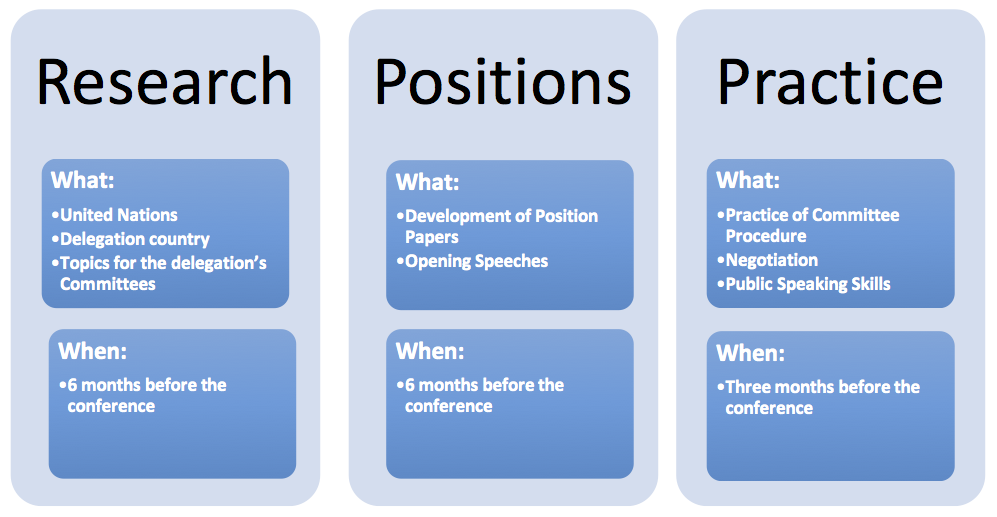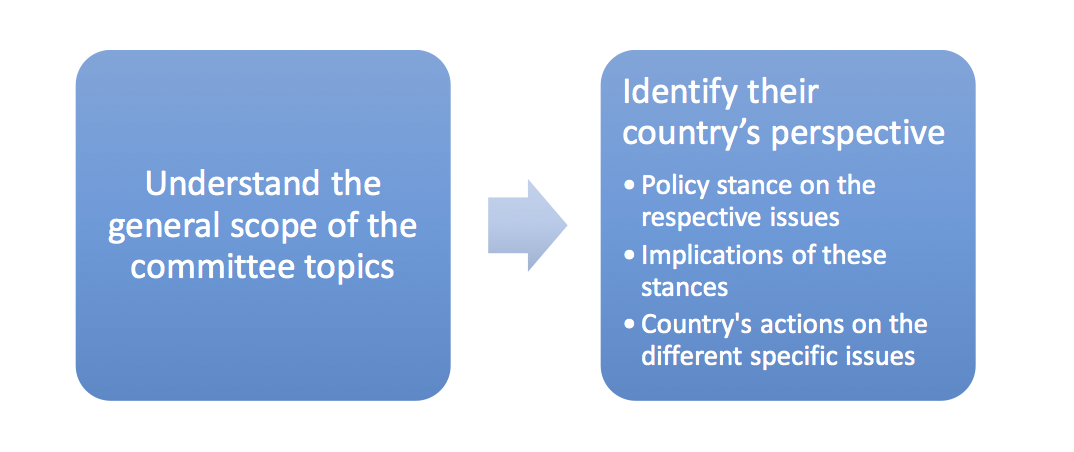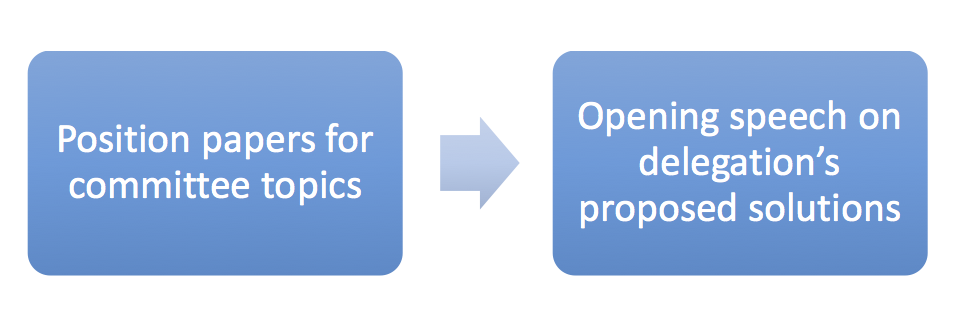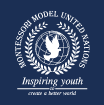Student Preparation
Getting ready for MMUN requires significant student dedication to accomplish the many necessary tasks.

Research
This background research lays the foundation for the students to understand the context in which they will be operating at the conference, as well as the necessary tools for developing their positions. This work needs to begin 6 months before the conference starts and is estimated to take roughly three months to complete.
UN Research
Students work as a group to research and understand the context of MMUN, i.e. The United Nations and its role in the world today. Students:
- Draw “Pictures of Peace” where students create pictures of world problems and illustrate possible solutions
- Study the history of the United Nations
- Investigate the role of the United Nations in the world today
- Discuss the limits of the UN
Country Research
Students work as a group to investigate the context of their delegation country, including:
- Geography
- Demography
- Historic
- Economic
- Culture
- Political Administration
MMUN has created a Country Research Template as a first approach to organizing this analysis. There are many sources to which to refer for the development of this national profile, including:
- The CIA Factbook
- The MMUN Teacher Manual with its resource lists
- Look for a member of your community who is native to the country you are representing to give a direct account of the country
- The Research Link
This country research also results in the students creating their delegation displays for the conference of:
- Country board display
- Containing key national information and background, generally addressing the:
- “Fundamental Needs of People Chart”
- Engagement with different senses (sight, smell, touch and hearing)
- Activities for interested individuals to learn more about this country
- Format: Freestanding tri-fold display board no larger than 36″ in width and 48″ in height
- Containing key national information and background, generally addressing the:
- Country flag for the Opening Ceremony
Topic Research
Students work in pairs to research the topics being addressed by their assigned committees. This work begins with students studying the MMUN background guides to better understand the committee topic, as well as consulting:
- Original references cited in the background guides
- UN website
- Other research sites, including news sources and key international organizations.
This research provides the foundation for the development the delegate position papers, as well as the basis of all their negotiations during committee sessions. Both students of each pair must be familiar with both committee topics, regardless of who authors the final position paper.
MMUN has created a Topic Research Template to structure the further research process. This work begins with understanding the overall scope of the committee topics to understanding the specific perspective of their delegation country, including:

The research phase creates the basis for the students’ development of their position papers for submission to the delegation committees.
Positon Papers are the culmination of all the hard work and research of the delegates. Students work to combine their country and topic research to understand their countries position on the topics in their committee.

Please note:
- Each pair of students is responsible for both papers on their delegation committee topics. Unless, a single delegate is the sole representation of their delegation on a committee, in which case they are responsible for both position papers.
- Position papers must be formally submitted to the committee chair for consideration 6 weeks before the conference (during Step 3 of registration). Only delegates who have submitted position papers will be allowed to participate in committee session.
Position Paper Outline
- Background of the Problem
- Introduction of the country and its history, with a focus on the committee topics
- Relevance of the issue on country.
- Country policies (and justification for these policies) with respect to the topics
- Quotes from the country’s leaders about the issue.
- Past International Action:
- Conventions and resolutions signed or ratified by the country.
- UN actions that the country has supported or has opposed.
- Actions taken by the government with regard to the issue.
- Statistics to back up the country’s position on the issue.
- Possible Solutions:
- What the country believes should be done to address the issue.
- What the country would like to accomplish in the committee’s resolution.
Here is a link to the Positon Paper Checklist.
Committee Procedures
In order to facilitate student engagement during the conference, students should practice the committee procedures over the last three months before the conference, including:
- Practice the rules of procedure, using the protocol for the conference
- Work on drafting resolutions, becoming familiar with the format including pre-ambulatory and operative clauses
- Using all voting procedures and the decision making process
- Hone student’s negotiation skills
- Practice public speaking
Some resources for this work include:
- Committee-in-the-Classroom which includes suggestions on activities for practicing procedures
- Rules of Procedure
- Decision Making Process
- MMUN Conference Procedures Video (Under the Teacher Portal)
Final Materials Checklist for the Conference
After all the prep work for the conference, it is important to remember to bring all the important relevant materials students have produced for the conference, including:
- Every Delegate: Research Binder with their research, the UN charter, position papers, and 1-minute opening speeches (must request to be added to the Speakers List in their position paper, if this is not done, delegate can pass a note to the Bureau at the conference requesting to be added to the list).
- Every Delegation:
- Country Display Board: a freestanding tri-fold display board no larger than 36″ in width and 48″ in height
- Country Flag
- Cultural Exchange Night: if you are performing, remember to bring any required props or costumes for your performance
Useful links
